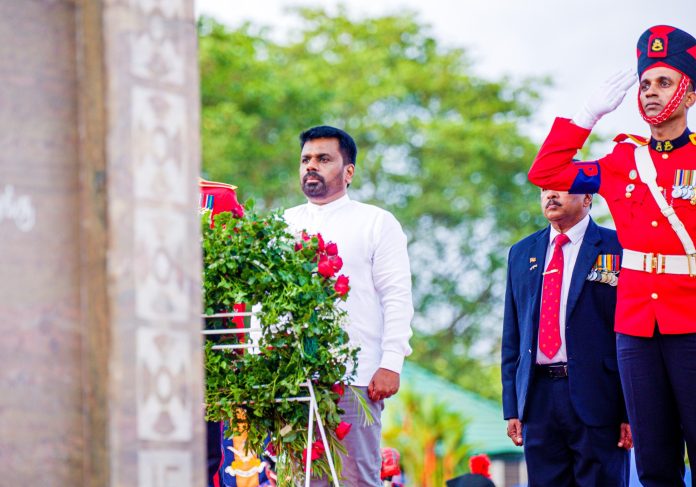At the 16th National War Heroes Commemoration held in Battaramulla yesterday (19), President Anura Kumara Dissanayake stood before the war heroes memorial and delivered a poignant and heartfelt speech. He called on all Sri Lankans to reject hatred and division, and to work together to build a nation founded on compassion, unity, and peace.
“Standing before this memorial and paying due respect to those who made the ultimate sacrifice is a commitment to creating a society free from hatred and conflict—a society grounded in brotherhood, love, and harmony,” he said.
The ceremony honoured the military personnel who lost their lives during Sri Lanka’s decades-long civil war. It was attended by the Tri-forces commanders who led the final phase of the conflict in 2009.
Full speech of the President:
For several decades, our country endured a devastating war. That war caused immense destruction to both the nation and its people. We were able to bring it to an end several years ago. Today, we remember and honour the military officers and soldiers who sacrificed their lives to achieve that outcome. Therefore, today must be recognised as a significant and historic day.
This commemoration is not only a remembrance of the war’s end, but also a moment for all the people of this country—Sinhalese, Tamil, Muslim, Burgher, Malay—to come together in unity, harmony, and brotherhood to rebuild our nation.
Over the years, many soldiers gave their lives to end this conflict. Their names are inscribed on these memorial boards, symbolising the dedication they showed in bringing the war to a close. Likewise, a great number of soldiers were permanently disabled. Even today, many among us bear the physical and emotional scars of war—having sacrificed eyes and limbs.
Their families, friends, parents, spouses, and even prisoners of war also made immense sacrifices in this national struggle. As a nation, we must never forget them. We owe them a lasting debt. There exists a deep, unbreakable bond of gratitude between us and those who sacrificed.
Yet, the word “war” itself stands for tragedy. War means destruction. You, who fought on the battlefield far more than I did, know this truth deeply. You understand the full weight of its tragedy and devastation.
Still, none of those who fought did so out of a desire for war. They fought with hope—for peace. War is a calamity. Today, regardless of whether one is from the North or the South, we have seen the grief and destruction it left behind.
Children who lost fathers, parents who lost children, spouses who lost partners—they still walk among us on this motherland. I know some come searching for names on these boards, gently tracing them with their fingers, searching for their sons, husbands, or loved ones. We understand the pain endured by mothers, children, and prisoners of war. They search with pride, but also with deep sorrow.
War is a tragedy. As a country that has endured such suffering, our responsibility is to ensure such a conflict never arises again. We must build a country free of conflict—a nation grounded in brotherhood, love, and compassion, rather than suspicion, anger, and hatred.
In both the South and the North, people still place photographs by the roadside, mourning husbands and children. Every child is precious to a parent. As a nation scarred by war, our duty is to prevent such brutality from ever returning.
Our past generations have fought wars. Hatred, anger, and suspicion have taken root. But for our children, we must create a nation free from war and division. Instead of hatred, there must be compassion. Instead of suspicion, there must be understanding. We must never allow the tragedies of our past to be repeated or forgotten. As a good people, we must learn from those events and turn them into lasting lessons.
So, what does our tragic history tell us? That such conditions must never be allowed to emerge again in our motherland. These experiences remind us that the path forward must not involve future generations going to war, but rather, building a nation free from it.
Standing before this war memorial and paying tribute to those who sacrificed their lives is a solemn vow to create a society free from hatred and conflict—a society filled with love, harmony, and unity.
Today, I stand before soldiers who can no longer walk freely upon the land they defended. I visited them this morning. Some have lived like this for nearly 30 years, dating back to 1996 or even 1988. They cannot voice their sorrow in words; they communicate their pain through tear-filled eyes.
We must bring an end to this tragedy. Shouldn’t we pass on to future generations a country of unity and prosperity?
Yet, what we see today is the manipulation of war, nationalism, and extremism for political gain. These were not natural developments—they were often exploited to secure power and conceal wrongdoing. Otherwise, there would have been no reason for the Field Marshal Sarath Fonseka to be imprisoned for over two and a half years. At that time, he and I worked closely, and it was clear that power—not justice—was at play. History has been weaponised to ignite further conflict, costing the lives of our children—both in the North and South.
The parents in our villages never asked for war—yet their children perished in it. We must recognise the sheer destructiveness of war. Yet some repeatedly defeated and rejected groups still glorify war, treating it as a pleasurable pursuit. But to the broader society, this is far from the truth. Must we continue to live in fear of such threats? No. We must rise together and speak out for peace. Our thoughts, words, and actions must align with the pursuit of peace.
Peace has become a symbol of forgiveness, growing into reconciliation. As humanity advances, we must champion humanism and compassion—loudly and clearly. What have wars given the world? Not victory, but destruction. Therefore, we must quietly and steadily work toward peace.
The so-called “pleasure” of war is nothing more than turning conflict into a river of blood to gain or preserve power—the bitter act of bathing in that blood. It is a false pleasure that we must utterly reject.
At this moment, the prayer of every soldier and officer—who upholds the law while carrying a weapon—is that they never have to use it. That is the prayer of humanity. It should be the collective prayer of society. Yet small groups constantly plot when to pull the trigger. No. We must firmly declare: the weapon in our hands will never be fired at another human being. We must say this without fear.
No one should fall victim to a grenade. We submit only to truth, to humanity—but not to violence. We must learn from history, not repeat it. We have shed enough blood. We are a nation soaked in it—rivers have run red. We are a nation flooded with tears. We have endured the deepest sorrows of war.
Those who survived the war carry those experiences with them. If they are to serve as lessons, then we must ensure that such conditions never arise again.
As I’ve said before, no one goes to war for the sake of war. Everyone who takes up arms does so with the hope of peace. We don’t fight to prolong conflict—we fight to achieve its end. That means our journey is not yet complete. The end of war marks only the beginning of our most critical mission: building lasting peace. Without it, we are not true victors. Real victory lies in national reconciliation and pea\ce. For this, we must stand strong and take every necessary step.
To every soldier and officer carrying a weapon, I urge you: be among those who worked for our nation’s peace—and among those who will continue to build it. To the parents, I say this: your children and husbands have made profound sacrifices. You are extraordinary. The best way to honour them is to build lasting peace on this land.
We must create a society where our children no longer live in fear of war. It is a difficult task, but one we must complete. Though I may not be in the best position to say this, I must warn: in both the North and South, conflicts are reigniting—not over justice, but over power and nationalism. True freedom has not yet been achieved just because the war has ended.
What does real freedom mean for our motherland? Even today, parts of our country suffer from drought and floods. Are we truly free? A conflict anywhere in the world affects our economy and livelihoods. Are we truly sovereign? We have lost our economic independence. Without a strong economy, we cannot make autonomous decisions. Therefore, to become a respected nation on the global stage, we must transform economically.
The rule of law must prevail, no matter the circumstances. Our governance must be worthy of global respect. We must create a country free from crime, disease, and hatred. Only then will we achieve real freedom and sovereignty. Otherwise, sovereignty will remain nothing more than a word on paper. It must be lived.
You and I share a deep love for this country and its people. We are committed to transforming our motherland into one of the finest in the world. Peace and harmony are essential for achieving this goal. Therefore, I believe we must have the courage to make every decision necessary in favour of peace and coexistence.
The monument before us symbolises the pride, courage, and selflessness of those who gave their lives. Their spirit must be etched into our own lives. Why? So that we may build a more just and prosperous nation.
Finally, we carry in our hearts the eternal memory of those who sacrificed everything to end the war, and of those who live on with permanent wounds. Their courage and devotion will guide us as we begin a new journey—a renewed struggle—for a brighter future.






